Fccs course test - Study guides, Class notes & Summaries
Looking for the best study guides, study notes and summaries about Fccs course test? On this page you'll find 10 study documents about Fccs course test.
All 10 results
Sort by
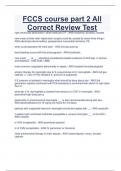
-
FCCS course part 2 All Correct Review Test
- Exam (elaborations) • 7 pages • 2023
- Available in package deal
-
- $12.49
- + learn more
FCCS course part 2 All Correct Review Test right ventricular dysfunction- what meds are CI? - ANS-morphine, diuretics, nitrates new onset a flutter after reperfusion surgery could be caused by these three things - ANS-electrolyte abnormalities, perioperative myocardial ischemia, PE when is perioperative MI most seen - ANS-3rd day post-op less bleeding occurs with this anticoagulant - ANS-bivalirudin new onset ___ or ___ should be considered possible evidence of ACS esp. in women and di...
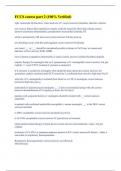
-
FCCS Cert (Fundamental Critical Care Support) 100% Correct.
- Package deal • 8 items • 2023
-
- $40.00
- + learn more
FCCS test (100% Correct Answers) FCCS course part 2 (100% Verified) Oracle FCCS Certification Questions (A+ Graded Solutions) FCCS Cert (Fundamental Critical Care Support) 100% Correct. FCCS - Fundamental Critical Care Support (A+ Guaranteed) FCCS Exam (Possible Questions with Accurate Answers) Review and Pretest FCCS (A+ Graded Already) FCCS Flash
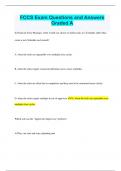
-
FCCS Exam Questions and Answers Graded A+(23/24)
- Exam (elaborations) • 82 pages • 2023
-
- $10.69
- + learn more
In Financial Close Manager, when would you choose to define tasks in a Template rather than create a new Schedule each month? A. when the tasks are repeatable over multiple close cycles B. when the tasks require consistent definition across close schedules C. when the tasks are often late in completion and they need to be monitored more closely D. when the tasks require multiple levels of approvers A. when the tasks are repeatable over multiple close cycles Which role can the "Approva...
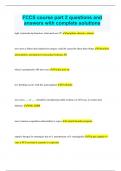
-
FCCS course part 2 questions and answers with complete solutions(23/24)
- Exam (elaborations) • 17 pages • 2023
-
- $8.99
- + learn more
right ventricular dysfunction- what meds are CI? morphine, diuretics, nitrates new onset a flutter after reperfusion surgery could be caused by these three things electrolyte abnormalities, perioperative myocardial ischemia, PE when is perioperative MI most seen 3rd day post-op less bleeding occurs with this anticoagulant bivalirudin
![2024 FCCS Final Exam [100% Correct] *Verified Q&A* (Accredited)](/docpics/6359109/670521260f1cb_6359109_121_171.jpeg)
-
2024 FCCS Final Exam [100% Correct] *Verified Q&A* (Accredited)
- Exam (elaborations) • 20 pages • 2024
- Available in package deal
-
- $9.96
- + learn more
2024 FCCS Final Exam [100% Correct] *Verified Q&A* (Accredited) What is the primary goal of the Fundamentals of Critical Care Support course? To equip healthcare providers with essential knowledge and skills for managing critically ill patients. Which of the following is considered a high-risk factor for developing Acute Respiratory Distress Syndrome (ARDS)? Sepsis. When assessing a patient with suspected shock, which parameter is most indicative of perfusion status? Blood pre...
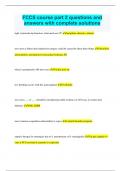
-
FCCS course part 2 questions and answers with complete solutions
- Exam (elaborations) • 17 pages • 2023
-
- $10.99
- + learn more
right ventricular dysfunction- what meds are CI? morphine, diuretics, nitrates new onset a flutter after reperfusion surgery could be caused by these three things electrolyte abnormalities, perioperative myocardial ischemia, PE when is perioperative MI most seen 3rd day post-op
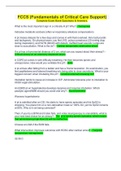
-
FCCS (Fundamentals of Critical Care Support)Complete exam review guide.
- Other • 33 pages • 2022
-
- $10.49
- + learn more
FCCS (Fundamentals of Critical Care Support) Complete Exam Bank Questions & Answers. What is the most important sign in a critically ill pt? Why? - Tachypnea Indicates metabolic acidosis (often w/ respiratory alkalosis compensation) A pt misses dialysis for a few days and comes in with fluid overload. He's tachycardic and tachypneic. On physical exam, you find JVD, pulsus paradoxus (20 mmHg drop during inspiration), and HoTN (80/40) with distant, muffled heart sounds. Lungs are clear ...
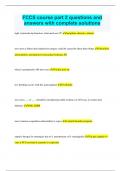
-
FCCS course part 2 questions and answers with complete solutions
- Exam (elaborations) • 17 pages • 2024
-
- $8.99
- + learn more
right ventricular dysfunction- what meds are CI? morphine, diuretics, nitrates new onset a flutter after reperfusion surgery could be caused by these three things electrolyte abnormalities, perioperative myocardial ischemia, PE when is perioperative MI most seen 3rd day post-op less bleeding occurs with this anticoagulant bivalirudin new onset ___ or ___ should be considered possible evidence of ACS esp. in women and diabetics SOB, LBBB
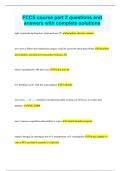
-
FCCS course part 2 questions and answers with complete solutions
- Exam (elaborations) • 17 pages • 2023
-
- $13.49
- + learn more
right ventricular dysfunction- what meds are CI? morphine, diuretics, nitrates new onset a flutter after reperfusion surgery could be caused by these three things electrolyte abnormalities, perioperative myocardial ischemia, PE when is perioperative MI most seen 3rd day post-op less bleeding occurs with this anticoagulant bivalirudin
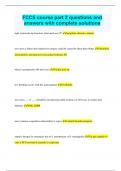
-
FCCS course part 2 questions and answers with complete solutions
- Exam (elaborations) • 17 pages • 2023
-
- $13.49
- + learn more
right ventricular dysfunction- what meds are CI? morphine, diuretics, nitrates new onset a flutter after reperfusion surgery could be caused by these three things electrolyte abnormalities, perioperative myocardial ischemia, PE when is perioperative MI most seen 3rd day post-op less bleeding occurs with this anticoagulant bivalirudin

$6.50 for your textbook summary multiplied by 100 fellow students... Do the math: that's a lot of money! Don't be a thief of your own wallet and start uploading yours now. Discover all about earning on Stuvia


